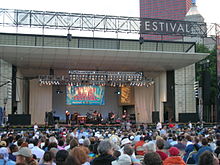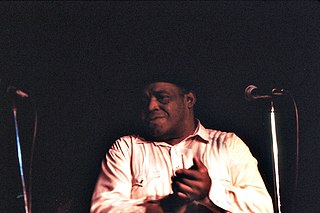
William James Dixon was an American blues musician, vocalist, songwriter, arranger and record producer. He was proficient in playing both the upright bass and the guitar, and sang with a distinctive voice, but he is perhaps best known as one of the most prolific songwriters of his time. Next to Muddy Waters, Dixon is recognized as the most influential person in shaping the post–World War II sound of the Chicago blues.

McKinley Morganfield, known professionally as Muddy Waters, was an American blues singer and musician who was an important figure in the post-war blues scene, and is often cited as the "father of modern Chicago blues". His style of playing has been described as "raining down Delta beatitude".
Chicago blues is a form of blues music developed in Chicago, Illinois. It is based on earlier blues idioms, such as Delta blues, but performed in an urban style. It developed alongside the Great Migration of the first half of the twentieth century. Key features that distinguish Chicago blues from the earlier traditions, such as the Delta blues, is the prominent use of electrified instruments, especially the electric guitar, and especially the use of electronic effects such as distortion and overdrive.
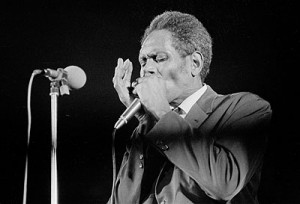
Walter Horton, known as Big Walter (Horton) or Walter 'Shakey' Horton, was an American blues harmonica player. A quiet, unassuming, shy man, he is remembered as one of the premier harmonica players in the history of blues. Willie Dixon once called Horton 'the best harmonica player I ever heard'.

James Henry Cotton was an American blues harmonica player, singer and songwriter, who performed and recorded with many of the other great blues artists of his time and with his own band. He played drums early in his career but is famous for his harmonica playing.
The American Folk Blues Festival was a music festival that toured Europe as an annual event for several years beginning in 1962. It introduced audiences in Europe, including the UK, to leading blues performers of the day such as Muddy Waters, Howlin' Wolf, John Lee Hooker and Sonny Boy Williamson, most of whom had never previously performed outside the US. The tours attracted substantial media coverage, including TV shows, and contributed to the growth of the audience for blues music in Europe.
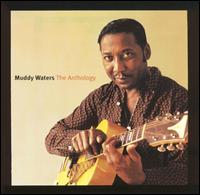
The Anthology: 1947–1972 is a double compilation album by Chicago blues singer and guitarist Muddy Waters. It contains many of his best-known songs, including his R&B single chart hits "I'm Your Hoochie Coochie Man", "Just Make Love to Me ", and "I'm Ready". Chess and MCA Records released the set on August 28, 2001.
The Long Beach Blues Festival, in Long Beach, California, United States, was established in full in 1980, and was one of the largest blues festivals and was the second oldest on the West Coast. It was held on Saturday and Sunday of Labor Day weekend. For many years it was held on the athletic field on the California State University, Long Beach campus. The 2009 festival, the 30th annual, was held at Rainbow Lagoon in downtown Long Beach. The Festival went on hiatus in 2010, and has not been held since.

John Primer is an American Chicago blues and electric blues singer and guitarist who played behind Junior Wells in the house band at Theresa's Lounge and as a member of the bands of Willie Dixon, Muddy Waters and Magic Slim before launching an award-winning career as a front man, carrying forward the traditional Windy City sound into the 21st century.
Spivey Records was a specialist blues record label founded by blues singer Victoria Spivey and jazz historian Len Kunstadt in 1961. Spivey Records released a series of blues and jazz albums between 1961 and 1985.

Debuting in 1973, the San Francisco Blues Festival was one of the longest running blues festival in the United States. Tom Mazzolini, the event's producer, founded the blues festival to educate the public about the history and evolution of the blues. Many of the performers at the early concerts were the pioneers and originators of the West Coast blues sound.

Willie Lee "Big Eyes" Smith was an American electric blues vocalist, harmonica player, and drummer. He was best known for several stints with the Muddy Waters band beginning in the early 1960s.
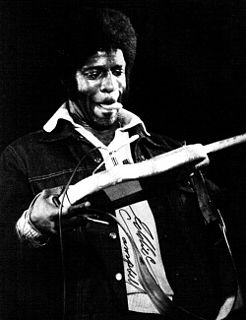
Eddie C. Campbell was an American blues guitarist and singer in the Chicago blues scene.
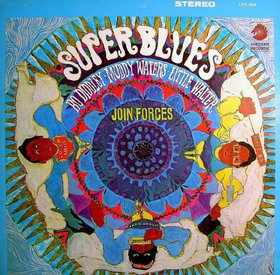
Super Blues is a 1967 studio album by a blues supergroup consisting of Bo Diddley, Muddy Waters, and Little Walter. The album was released in both mono and stereo formats by Checker Records in June 1967. A follow-up album The Super Super Blues Band was released later that year and featured Howlin' Wolf replacing Little Walter.

Fathers and Sons is the seventh studio album by the American blues musician Muddy Waters, released as a double LP by Chess Records in August 1969.

Harmonica Hinds is a Trinidadian-American blues singer and musician. He moved from Trinidad to Canada and then settled permanently in Chicago. He was influenced by blues musicians and started playing harmonica at an early age. He became known in the 1970s, when he played on the house band of Theresa's Lounge in Chicago. He shared the stage with and played on albums by many blues musicians for more than five decades, making his first recording in 2008. Further recordings were made in 2010 and 2012. He has been described as one of the most talented Chicago blues musicians and remains active on the Chicago blues scene.
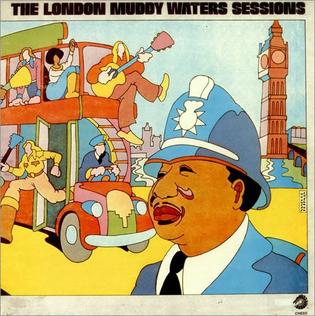
The London Muddy Waters Sessions is a studio album by Muddy Waters, released in 1972 on Chess Records. A follow-up to 1971's The London Howlin' Wolf Sessions, the concept was to combine American bluesmen with British blues/rock stars. The album was an attempt to capitalise on the increasing popularity of traditional blues music and blues artists in Britain.

The Super Super Blues Band is an album by blues musicians Howlin' Wolf, Muddy Waters and Bo Diddley released on the Checker label in 1968.
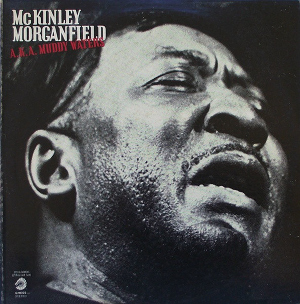
McKinley Morganfield A.K.A. Muddy Waters is a compilation album by blues musician Muddy Waters featuring tracks recorded between 1948 and 1953 released by the Chess label in 1971.
